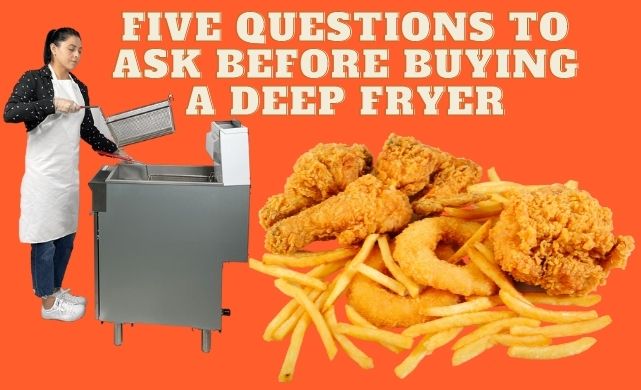In the market for a deep fryer? It’s a great way to expand your menu; nacho chips, mozzarella sticks, vegetables, chicken, shrimp and the classic french fry are all delicious fried. And you can add a fryer even when you have a limited amount of floor space because they don’t take up a tremendous amount of room. Before you get ready to test out some commercial deep fryers, here are a few questions you should ask:
1. What is on your menu?
Different types of foods do better in different types of fryers. If you plan on cooking items that produce low sediment, like french fries or egg rolls, an open pot fryer will be a good choice. If you’re cooking products like onion rings, fried fish or chicken or other product that has heavy breading (or sediment) a tube fryer is your best option. And heavily battered products like funnel cakes are best suited to flat bottom fryers.
2. What utilities are available in your foodservice kitchen?
Know ahead of time if you want a gas fryer, electric fryer or liquid propane fryer. Are you looking for an outdoor fryer model for a patio kitchen? You can usually find outdoor fryers with liquid propane or natural gas connections and these can even be hard connected for a year round outdoor kitchen.
3. What is your fried food output?
You need to know how much fried food you expect to prepare in order to determine the size of the fryer or fryers you purchase. As a rule of thumb, the capacity is determined by how many pounds of french fries a fryer can cook in one hour. To get a quick estimate, you can double the amount of the fryer oil tank capacity to get this number, so a 40 gallon deep fryer should have the capacity to produce 75 to 80 pounds of french fries hourly. Countertop fryers have much less capacity than floor models but can be ideal for foodservice operations that fry single items to order or smaller volume. Larger volume kitchens often utilize banks of fryers or multi-tank floor units.
4. How will you filter your fryer oil and clean your fryer?
Here’s where your operation and staff play a big role. If you are concerned that your staff won’t be able to keep a regular and frequent cleaning and filtering, you may want to look into fryers that have easier cleaning and filtration options. Fryer oil is the most expensive part of offering fried foods and maintenance of the fryer oil is a cost saver and a quality control measure because it directly affects the flavor of your food. There are many new technologies designed to increase oil life and lower oil costs. Be sure to look for features like built in straining and filtering or fryers that limit the amount of oil needed in the fry pot.
5. How important is energy efficiency?
Most operators will immediately respond that energy efficiency is important, but once they see that the cost to purchase an Energy Star fryer is a bit more than a unit that isn’t Energy Star, they change their tune. When considering an Energy Star fryer or any piece of commercial kitchen equipment that is Energy Star certified, it’s important to take the long view and know that you will save money over the long road in utility savings. You should also check with your utility company and your state or local authorities because there may be tax incentives or rebates for purchases of Energy Star equipment.
Spend a little time answering these five questions before you start your shopping and you’ll find the right fryer for your foodservice operation so you can start delivering deep fried deliciousness to your customers.
